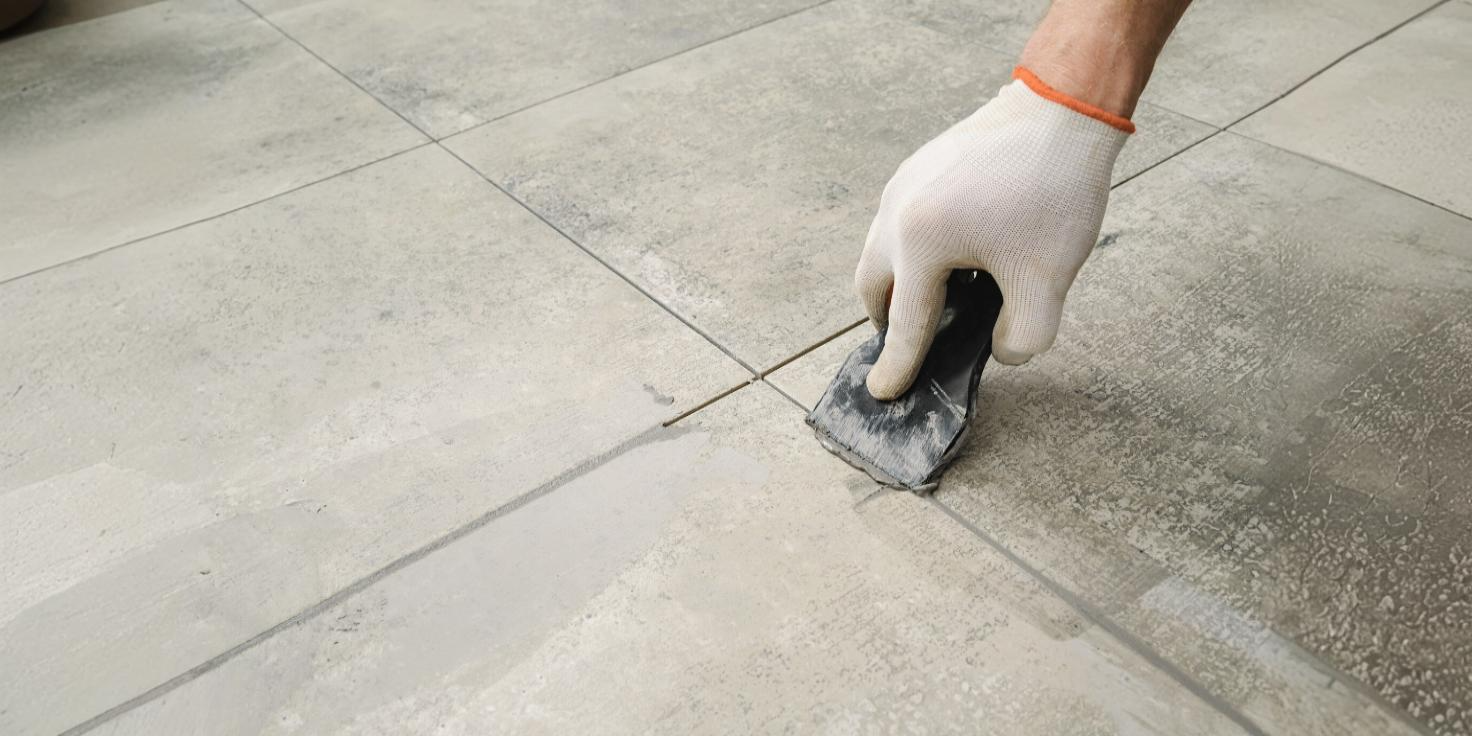
Tile grout is an essential element in the tile installation process, playing a vital role in both the functionality and appearance of tiled surfaces. Whether you’re installing floor tiles, wall tiles, or even backsplash tiles, grout helps secure the tiles in place, ensures water resistance, and provides a polished, professional finish. But what exactly is tile grout, and why is it so important? In this comprehensive blog, we’ll explore the concept of tile grout, the different types available, its importance, and how to choose and maintain grout for a long-lasting and effective tile installation.
What is Tile Grout?
Tile grout is a dense mixture made from water, cement, sand, and other additives, used to fill the gaps or joints between tiles. After the tiles are installed, grout is applied to the spaces between them, filling the gaps and providing a uniform finish. Once it dries, grout hardens to form a bond that holds the tiles in place.
Grout comes in a variety of types and formulations, each suited for specific types of tiles and installation needs. Here are the main types of tile grout:
1. Cement-Based Grout
This is the most common type of grout, made from a mixture of Portland cement, water, and sand. It’s typically available in two forms:
Sanded Grout: Contains sand and is ideal for larger grout lines (usually 1/8 inch or wider). It provides a strong, durable bond for floor tiles and wall tiles in high-traffic areas.
Unsanded Grout: Used for narrower grout lines (usually less than 1/8 inch), this type of grout does not contain sand, making it ideal for delicate tiles like porcelain or glass, which may get scratched by sand particles.
2. Epoxy Grout
Epoxy grout is a high-performance, non-porous grout made from epoxy resins and hardeners. It’s much more durable and water-resistant than cement-based grout, making it ideal for wet areas like bathrooms, kitchens, and swimming pools. Epoxy grout also resists staining and discoloration, making it an excellent choice for areas prone to food spills or heavy foot traffic. However, it is more difficult to work with compared to cement-based grout and tends to be more expensive.
3. Furan Grout
Furan grout is similar to epoxy grout but made from polymerized alcohols and phenolic compounds. It is a specialty grout typically used in industrial or commercial applications due to its high chemical resistance and durability in extreme conditions.
Why is Tile Grout Important?
Tile grout plays several essential roles in the tile installation process, far beyond just filling in the spaces between tiles. Here are the primary reasons why grout is so important:
1. Secures the Tiles in Place
One of the most critical functions of grout is to hold the tiles in place. Without grout, tiles would shift or become dislodged due to movement or pressure. Grout not only bonds the tiles to the surface but also helps to lock them together, providing structural integrity to the entire installation. Over time, without grout, tiles would begin to separate or fall off.
2. Prevents Water Penetration
Grout acts as a barrier to moisture, preventing water from seeping into the joints between tiles. In areas with high humidity or regular exposure to water, like bathrooms and kitchens, water can easily seep into gaps between the tiles, potentially leading to mold, mildew, or water damage. Properly applied grout forms a seal, ensuring that water is unable to penetrate the surface and protect the underlying substrate (floor, wall, or ceiling) from moisture-related damage.
This is particularly important in wet areas such as showers, pools, and steam rooms, where grout is vital for waterproofing and moisture protection.
3. Enhances the Appearance of the Tiled Surface
Grout plays a crucial role in the overall aesthetic of your tiled surface. The grout color and finish can complement or contrast with the color of your tiles, allowing you to enhance the visual appeal of the space. For example:
Light-colored grout can make tiles appear more prominent, creating a high-contrast, vibrant look.
Dark-colored grout can provide a sleek, contemporary appearance by blending seamlessly with the tiles.
In addition, clean and well-maintained grout lines contribute to a neat, polished finish, enhancing the overall look of the tiled area. Grout also helps create clean, straight lines between tiles, giving the entire installation a uniform and professional appearance.
4. Prevents Cracking and Shifting
As your floor or wall expands and contracts with temperature and humidity changes, grout acts as a buffer, allowing slight movements without causing cracks or gaps between the tiles. This is especially important in floors that experience high foot traffic or outdoor spaces that may be subject to temperature fluctuations. Grout absorbs the movement, helping to prevent tile cracks or shifting, which can lead to unsightly gaps and structural problems.
5. Improves Hygiene and Easier Cleaning
Tile grout helps to maintain a hygienic environment, especially in areas that are prone to moisture, food spills, or dirt accumulation. By filling the spaces between tiles, grout prevents food, dirt, and bacteria from collecting in gaps, making it easier to clean the entire surface. Grouted surfaces also prevent water from seeping under the tiles, which can result in mold or mildew buildup over time.
In kitchens and bathrooms, grout lines are essential for maintaining a clean, hygienic surface and preventing microbial growth.
6. Adds Durability
High-quality grout significantly enhances the durability of tile installations. Cement-based grout is already known for its strength, while epoxy grout offers additional durability, especially in high-traffic or high-moisture areas. Choosing the right grout ensures that your tiles remain securely in place and that the surface maintains its strength over time.
How to Choose the Right Grout?
Selecting the right grout is essential for the success of your tiling project. Here are some factors to consider when choosing grout for your installation:
1. Tile Material and Type
The type of tile you are using affects the kind of grout you should choose. For delicate tiles such as glass or porcelain, you’ll want to use unsanded grout to avoid scratches. For natural stone tiles like marble or granite, ensure that the grout is suitable for stone installations to prevent staining.
2. Joint Width
The size of the grout joint determines whether you should use sanded or unsanded grout. Sanded grout is ideal for wide joints (more than 1/8 inch), while unsanded grout works best for narrower joints (less than 1/8 inch).
3. Location of the Tiles
In areas that experience frequent moisture exposure, such as bathrooms or kitchens, epoxy grout or a water-resistant cement-based grout should be used. For outdoor installations or areas that are subject to heavy foot traffic, you may want to opt for more durable, high-performance grout.
4. Grout Color
Grout color can have a significant impact on the overall design. Light grout colors can make the tiles pop, while dark colors can create a sleek, modern look. Choose a grout color that either complements or contrasts with your tiles and fits the overall design of the space.
How to Maintain Tile Grout?
Grout, particularly cement-based varieties, is porous and can absorb dirt, stains, and moisture over time. Here are some tips to keep your grout in good condition:
Seal the Grout: Once grout has dried and cured, seal it with a grout sealer to prevent stains and water penetration.
Clean Regularly: Use a mild cleaner and a grout brush to scrub grout lines and prevent buildup of dirt and grime.
Avoid Harsh Chemicals: Avoid harsh chemicals or abrasive tools that can damage grout and cause discoloration.
Reapply Sealer: Depending on usage, you may need to reapply grout sealer every few years to maintain its water-resistant properties.
Final Thoughts
Tile grout is a small but crucial element in tile installation, offering several benefits such as securing the tiles in place, preventing water penetration, enhancing the aesthetic appeal, and improving hygiene. By choosing the right grout for your tile installation and maintaining it properly, you can ensure that your tiled surfaces remain functional, beautiful, and durable for years to come. Whether you’re renovating your bathroom, kitchen, or any other space, grout is a key player in ensuring that your tile installation performs well and looks great.
Need expert-grade Tile Grout?
Choose trusted brands that ensure high bonding strength and durability. Always buy from authorized suppliers and follow installation guidelines for the best results.

